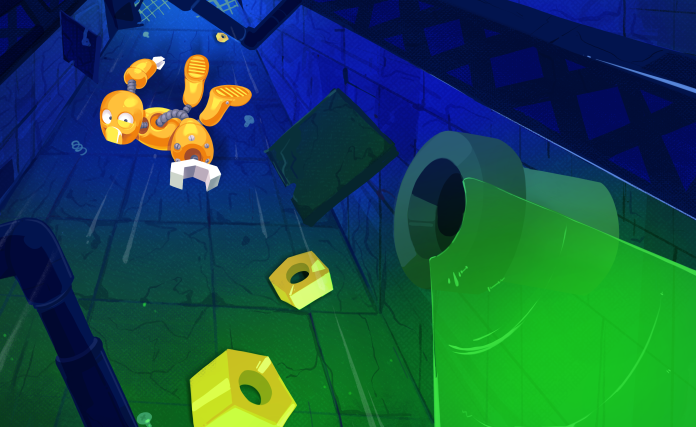Let’s be honest. Mobile games don’t have the best reputation. Access barriers are virtually non-existent on Google Play and Apple’s App Store, and this has led to an endless stream of more or less miserable titles that seem to exist solely to bombard you with ads or steal your data. In addition to games that are downright misleading, we also find games from major producers that deliver what they promise, but also use every psychological trick in the book to lure players into spending money on microtransactions.
In such a noisy digital flea market, it can be incredibly difficult for smaller developers who actually want to make good games to be heard and seen. Especially since, in the fierce battle for users’ fleeting attention, they not only have to compete with other games, but also with notifications from other apps, calls from grandmothers, and messages from friends. Nevertheless, they are out there, the small developers fighting to break through on mobile platforms. And perhaps take the next step to consoles.
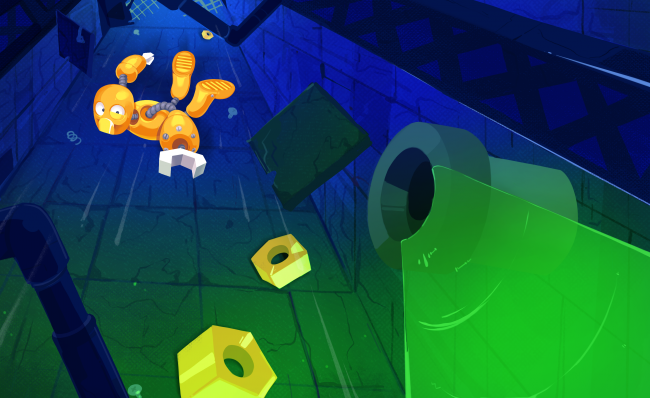
The auto runner genre turned upside down
One of these developers is Danish Gearhead Games, based in Solrød Strand near Køge Bugt. The small studio consists of the duo Nicolai Danielsen and Constantine Berg, and despite their limited workforce, they still have five games available on mobile devices. On Google Play, where most of the reviews are, the games score between 4.3 and 4.8 (out of 5), and their most downloaded game, Retro Highway, has over half a million downloads.
Last year, the studio released its most ambitious title to date, an endless runner called Scrap Divers. However, the genre description is a bit misleading. Because you don’t run. You fall. And not even with a parachute, as in the Sky Diver game you may remember from the old Nokia phones. No, it’s free fall. As in God of War III, where Kratos at one point plunges into a seemingly endless hole and has to avoid all kinds of obstacles. The poor robots in Scrap Divers, however, do not have the robust physique of the Greek god of war, nor do they have magical wings to cushion their fall. On the other hand, they are mass-produced, and a new one is always ready to take over.
This is an ad:
“We have worked with the auto-runner genre before and wanted to challenge ourselves with a new angle – literally – so the idea of turning it all upside down and letting the player fall instead of run came quickly,” explains game designer Nicolai Danielsen about the game’s premise.
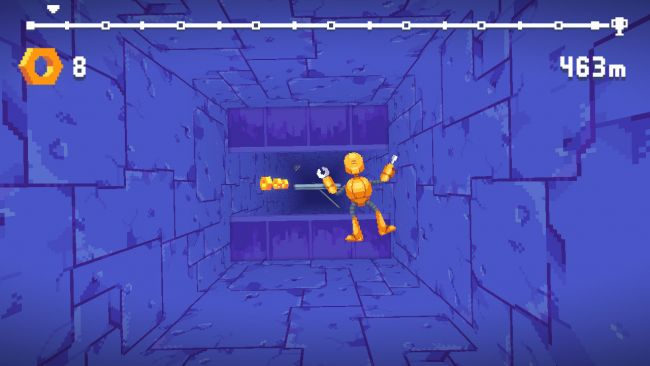
The road to console
A unique premise is a good start, but far from complete on mobile platforms, where users quickly move on to the next game and uninstall if you don’t hold their attention. Gearhead Games therefore designed 15 different robots, each with their own unique characteristics that can be gradually unlocked, as well as eight different environments with unique obstacles.
This is an ad:
The result was a game with approximately 5-6 hours of playtime without the use of artificial barriers and half-hearted filler to extend the playtime. This is particularly beneficial to the game, as it made the leap to console back in March.
“Scrap Divers wasn’t originally intended for console, but during development we realised that a controller actually suits the game quite well – the joystick in particular works really well for controlling the falling robots, a bit like in a flight game. So the transition was surprisingly straightforward, and we were lucky that the controls could be transferred without changing the gameplay itself.”
“The element of the robots losing limbs wasn’t there from the start. It actually came about as a natural extension of the animation system.”
Although Scrap Divers is now available for consoles, parts of the design still bear the mark of its mobile origins. This applies, among other things, to the music, which was created by the studio’s regular collaborator Mikhail Rublyov.
“We asked him to create a soundtrack that combines punchy 8-bit percussion with surf rock guitar riffs to give the game a slightly offbeat and energetic vibe that matches its pace and style. The reason there aren’t that many different melodies is actually partly practical, as most mobile gamers have the sound turned off anyway.”
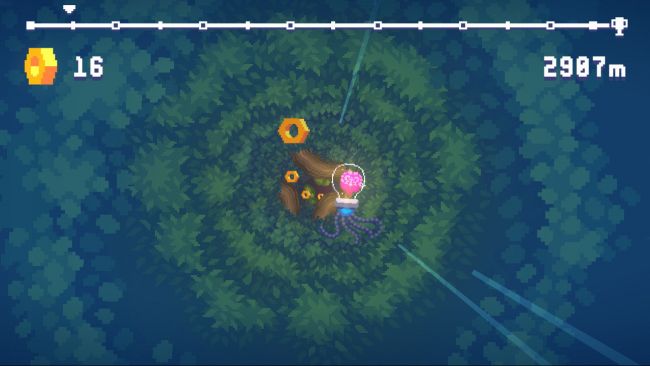
A bleak but entertaining future
“The future… sucks.” That’s all you get to know about the universe in Scrap Divers, but that’s all you need to know. The seemingly post-apocalyptic world is populated only by robots, and the only thing human left is their raw sadism, they amuse themselves by throwing each other into endless holes. Despite the deserted universe, the game still exudes life, thanks to lively sprites and simple but effective effects that give the feeling of free fall.
“After the success of Retro Highway, we have stuck to our goal of combining classic arcade aesthetics with modern gameplay. Graphically, we have taken the retro look very seriously. There are no 3D assets in the game, the entire sense of depth is created using techniques from the 90s “super scalers,” where 2D elements are distorted, scaled, and layered. Some of our assets actually consist of 30+ individual layers, all of which are hand-drawn,” Danielsen explains about the game’s graphic style.
“When it comes to advertising, the reality is that it’s virtually impossible to survive in the mobile market with a paid game unless you’re already a big name.”
The old-fashioned working method also led to one of the game’s most unique mechanics by accident. As they fall, the poor robots can have their bodies torn apart. This obviously affects their balance. But as long as the central CPU doesn’t break, you still have a chance and can hope for a power-up that repairs your robot.
“The element of the robots losing limbs wasn’t there from the start. It actually came about as a natural extension of the animation system. I was working on making their movements look more lifelike, and since the limbs were already separate sprites, it seemed obvious (and quite fun!) to let them fall off along the way.”
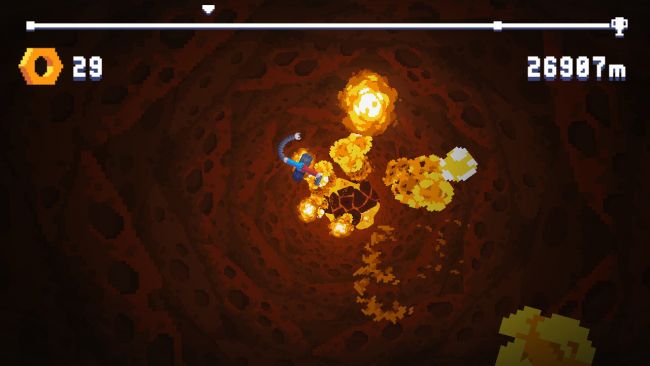
Your death, the developers’ bread and butter?
No, the poor robots don’t have it easy. The varied level design is sometimes reminiscent of a kind of vertical torture chamber, with all kinds of traps ready to turn the robots into electronic waste. You’re going to die. Again and again. Unless you’ve invested in the ad-free version for a few pounds, you’ll see a lot of ads for various mobile games with highly questionable marketing techniques. The ads here function almost like the coins you used to throw into arcade machines in the old days. Here, you just pay with your attention instead.
For Gearhead Games, it’s a delicate balancing act. But the ads are hard to avoid, as few people will download a game that asks for payment at the entrance. So it’s better to lure people in with free admission and hope they buy the ad-free version later.
“When it comes to ads, the reality is that it’s virtually impossible to survive in the mobile market with a paid game unless you’re already a big name,” explains Danielsen. “That’s why we’ve chosen the free model with ads, which we see as “the best of both worlds.” Everyone can play the game for free, and those who still want to buy the game can simply pay to remove all the ads. We have deliberately avoided microtransactions.”
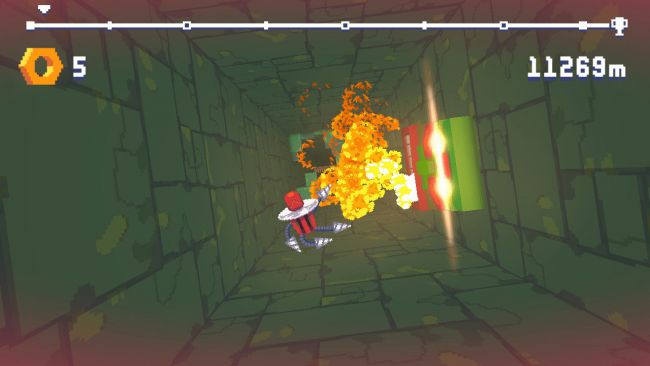
The last level, however, stands out a bit. Here, you reach something resembling hell with flaming balls, tearing spikes and other unpleasantries that come at you with tremendous speed. Appropriately, it’s devilishly difficult. Yes, you almost get the suspicion that the developers have deliberately turned up the difficulty level to expose the player to as many ads as possible, now that the journey is coming to an end. However, Danielsen denies that this is the case.
“The difficult final level is not designed to show advertisements or entice a full purchase. As a developer, I have played Scrap Divers countless times myself, and therefore the final level was deliberately made a little extra challenging, mostly to give myself and other experienced players a proper ending to the journey. In this way, the game spans the entire spectrum: from easy to challenging. And yes, I’m not too keen on the content of the advertisements either. So we’re looking more towards PC and console in the future, where we can offer an experience completely free of advertisements.”
In addition to iOS and Android, Scrap Divers is also available on Nintendo Switch, PlayStation 4, PlayStation 5, and Xbox One, if, like the developers themselves, you’d rather not have to deal with ads. For the console versions, the price is between £4.20 and £4.50, but until August 6, the Switch version is available for only £1.52.
